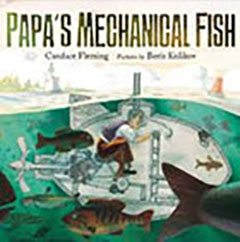 I remember it clearly—the day the inspiration for Papa’s Mechanical Fish fell in my lap. I was sitting cross-legged on the basement floor of the Old Lighthouse Museum in Michigan City, Indiana, rummaging through a box of photographs when a crumbling, decades-old booklet slipped from a manila folder. The booklet told the tale of a local inventor named Lodner Phillips who in 1851 developed a submarine that not only had an air-purifying system and a steam boiler, but a chandelier and velvet carpets to boot. I was intrigued. But it wasn’t until I read this sentence that I became obsessed: “He so perfected his submarine that one day he took his wife and children with him and spent a whole day exploring the bottom of the lake.”
I remember it clearly—the day the inspiration for Papa’s Mechanical Fish fell in my lap. I was sitting cross-legged on the basement floor of the Old Lighthouse Museum in Michigan City, Indiana, rummaging through a box of photographs when a crumbling, decades-old booklet slipped from a manila folder. The booklet told the tale of a local inventor named Lodner Phillips who in 1851 developed a submarine that not only had an air-purifying system and a steam boiler, but a chandelier and velvet carpets to boot. I was intrigued. But it wasn’t until I read this sentence that I became obsessed: “He so perfected his submarine that one day he took his wife and children with him and spent a whole day exploring the bottom of the lake.”
Really? A family ride under Lake Michigan in 1851? It was a Jules Verne novel… only true!
Convinced I’d just found the subject for an amazing nonfiction picture book, I hurried up the stairs. What more did the museum have about Lodner Phillips? The curator directed me to a thin file containing a clutch of faded newspaper clippings; most published nearly a century earlier. From them I gleaned the basics of Phillips’ life—his date of birth, a list of his accomplishments, the year he died. But I didn’t uncover a single thing about him as husband, father, or underwater adventurer. Not one thing.
An online search was equally fruitless. Nothing extensive had been written about Phillips. His name did appear in a few maritime histories, but these passages— mere mentions really—added nothing to my understanding of him as a person.
Wracking my brain, I jotted down any and all possible sources of information— county clerk records, estate rolls, tax records. The 1850 U.S. Census, I figured, would be able to provide the names and ages of Phillips’ children. And what about the United States Patent Office? Surely, the inventor sought a patent for his submarine. I even included the Department of the Navy in hopes Phillips had written someone there about his invention. For good measure, I contacted experts from the Chicago History Museum and the Great Lakes Maritime Museum.
And over the next few months, I mined some riches, including hand-drawn blueprints of the submarine’s design, and archival photographs of the vessel being salvaged from the Chicago River. I even uncovered a detailed description of the submarine’s workings written by the inventor himself. But here’s the rub— not one of those sources provided clues to Phillips’ thoughts or feelings. There were no hints about his relationship with his family, and not a single, concrete detail about their incredible, underwater trip.
My idea for a nonfiction story was sunk (no pun intended). Good history, that is, history that connects with young readers, requires a human viewpoint. My readers needed to be able to walk around in Phillips’ shoes, watching the action unfold through his eyes.
I considered abandoning the project. But to do so felt as if I was turning my back on Phillips. So I decided to tell a different story—part his and part mine—using those few, known fragments of history, and filling in the rest with my imagination. No, it wasn’t the book I set out to write. But in the end, it might be a better one. This tale is not just about a submarine. It’s about perseverance, the creative impulse and the unwavering faith of a loving family.
I can’t document it, but I like to think Lodner Phillips possessed all three.


3 Responses
It’s interesting to learn all the twists and turns behind-the-scenes of this book. Thanks for sharing!
Wondeful post Candy! Inspires me to continue with a picture book steeped in history with an incredible character that also needed to come to life. I loved PMF.
Candice,
I am “Papa” to two grandsons. At ages 3 and 6, I am the “brilliant” inventor and intrepid explorer to them. THEY LOVE THIS STORY ABOUT THEIR “PAPA.” They are convinced by the similar EPIC-FAIL stories my family mockingly tells of my growing up, that I am one-in-the same “Papa” in your story. I think I am mostly flattered. ha ha
A lot of Engineers, dreamers, backyard inventors, husbands and fathers are exposed eventually by our teen children, when they prove that we aren’t as superhuman as they may have believed as children and we fall off our pedastals.
This story (and back story) spoke to me. My children remember my crazy failures– the more epic the invention failure the more legendary my mediocraty became.
Thank you for sharing the story “your way”.
I wish you to write more “PAPA’s.…” stories. It would be blessing to me.
Micheal Austin (mediocre at best, but living large in my grandsons’ fantasy)